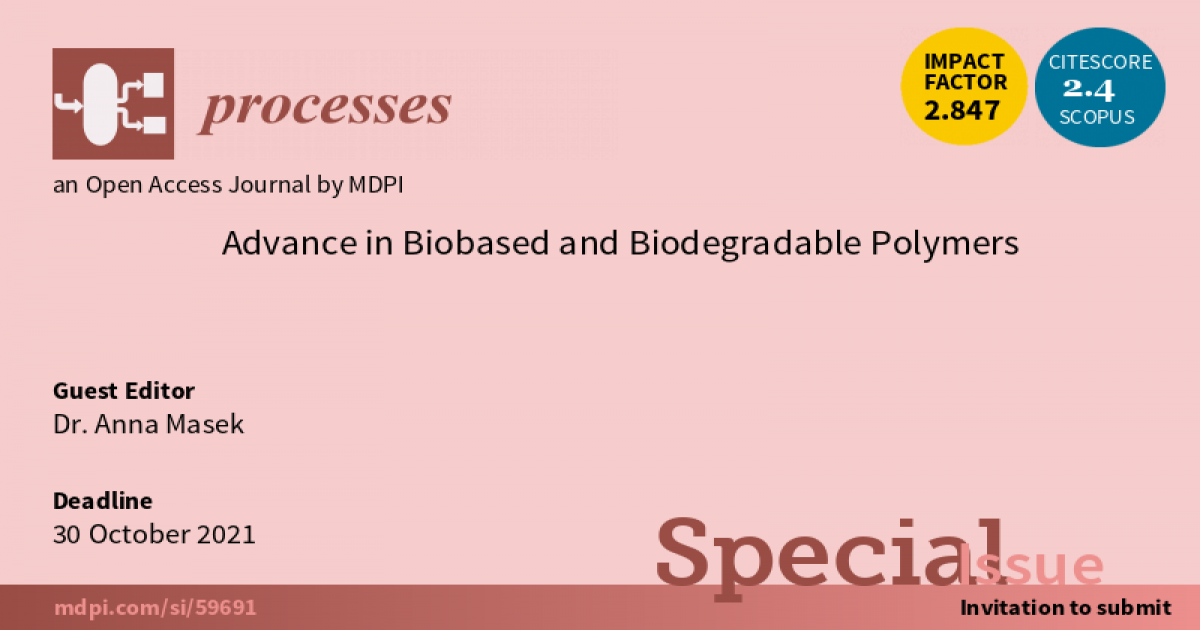Advance in Biobased and Biodegradable Polymers
A special issue of Processes (ISSN 2227-9717). This special issue belongs to the section "Materials Processes".
Deadline for manuscript submissions: closed (30 October 2021) | Viewed by 439

Special Issue Editor
Interests: cellulose fibers; surface modification; moisture content; ethylene–norbornene copolymer; biocomposites; polylactide; polymers; elastomers; flavonoids; polyphenol; antioxidant; aging of polymer; degradation of polymer; stabilization; stabilizers; substances of plant origin; biodegradation; extracts; biopolymers; polyester; PLA; PHA
Special Issues, Collections and Topics in MDPI journals
Special Issue Information
Dear Colleagues,
The production of biodegradable polymers in different areas of technology, including food chemistry, food technology, processing of polymer, chemistry, nanotechnology, proecological composites and packaging, agriculture or medicine.
Polymers are common used in everyday life. For economic reasons and specific properties, they replace traditional materials such as glass, wood, and paper. The use of polymeric materials generates waste whose disposal is difficult. Legislation and pressures on the use of ecological materials have increased interest in biodegradable and biobased polymers.
Biodegradation of polymeric biomaterials involves cleavage of hydrolytically or enzymatically sensitive bonds in the structure of polymers leading to erosion processes. This Special Issue is intended to feature methods for producing biodegradable and biobased polymers, new developments, detailed characterizations of biopolymers and properties, chemical structure, sources, production or synthesis methods, and examples of their application.
Dr. Anna Masek
Guest Editor
Manuscript Submission Information
Manuscripts should be submitted online at www.mdpi.com by registering and logging in to this website. Once you are registered, click here to go to the submission form. Manuscripts can be submitted until the deadline. All submissions that pass pre-check are peer-reviewed. Accepted papers will be published continuously in the journal (as soon as accepted) and will be listed together on the special issue website. Research articles, review articles as well as short communications are invited. For planned papers, a title and short abstract (about 250 words) can be sent to the Editorial Office for assessment.
Submitted manuscripts should not have been published previously, nor be under consideration for publication elsewhere (except conference proceedings papers). All manuscripts are thoroughly refereed through a single-blind peer-review process. A guide for authors and other relevant information for submission of manuscripts is available on the Instructions for Authors page. Processes is an international peer-reviewed open access monthly journal published by MDPI.
Please visit the Instructions for Authors page before submitting a manuscript. The Article Processing Charge (APC) for publication in this open access journal is 2400 CHF (Swiss Francs). Submitted papers should be well formatted and use good English. Authors may use MDPI's English editing service prior to publication or during author revisions.
Keywords
- Biodegradable polymers
- Biobased polymers
- Biodegradation
- Biomonomers
- Renewable resources
- Bioadditives
- Plant materials
- Biopolymers
Benefits of Publishing in a Special Issue
- Ease of navigation: Grouping papers by topic helps scholars navigate broad scope journals more efficiently.
- Greater discoverability: Special Issues support the reach and impact of scientific research. Articles in Special Issues are more discoverable and cited more frequently.
- Expansion of research network: Special Issues facilitate connections among authors, fostering scientific collaborations.
- External promotion: Articles in Special Issues are often promoted through the journal's social media, increasing their visibility.
- Reprint: MDPI Books provides the opportunity to republish successful Special Issues in book format, both online and in print.
Further information on MDPI's Special Issue policies can be found here.





